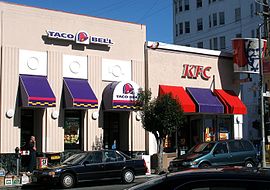Brand alliances

Brand alliances is a branding strategy used in a business alliance. Brand alliances are divided into three types.
Cobrands
Cobrands are the usage of two or more brands on one certain product. For example, Dell computers carries three brands on their packages and cases: Dell, Microsoft Windows, and Intel. A visible example of cobranding is Yum! Brands combining two or more of their restaurants under one roof. In many places it is not unusual to see a Taco Bell and KFC or a Pizza Hut and WingStreet combined.
Brand licenses
Brand licenses are a contractual agreement where a company lets another organisation use its brand on other products in exchange for a licensing fee. An example of brand licensing is seen in the Walt Disney Company's relationship to Tokyo Disneyland. The theme park is owned by The Oriental Land Company, which licenses the theme from The Walt Disney Company.
Cross Marketing
Cross Marketing is an agreement for mutual promotion between two companies. One company for instance will include coupons for another company in its parcels to its clients if the other company will agree to include a promotion from the other company in its direct mails to its client base.
References
- Ferrell, O.C. and Hartline, Michael (2005). Marketing Strategy. Thomson South-Western. ISBN 0-324-20140-0.
{{cite book}}: CS1 maint: multiple names: authors list (link)
